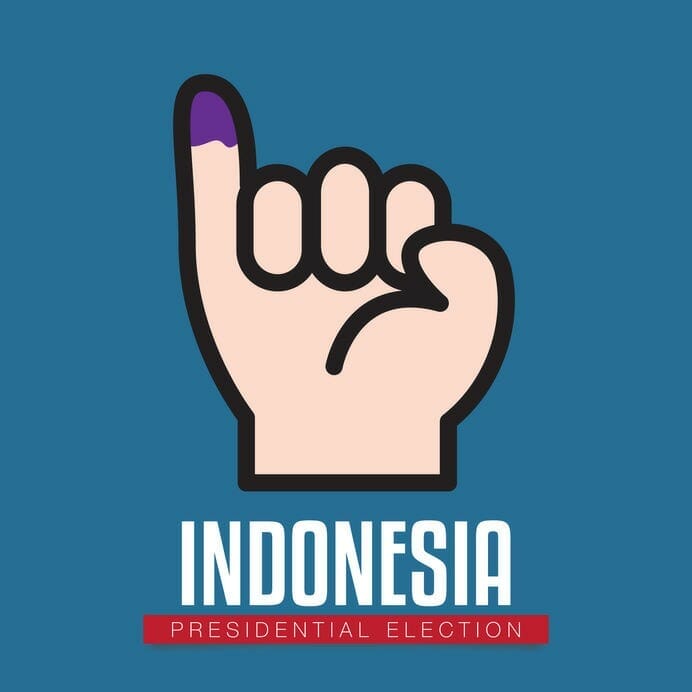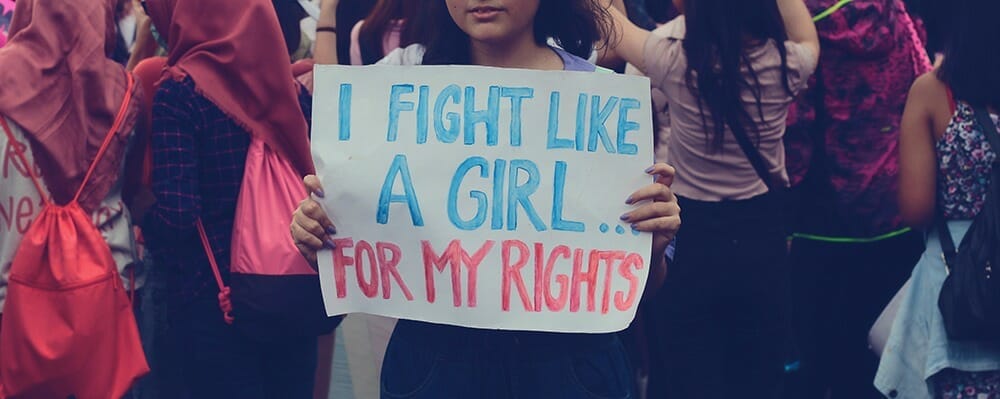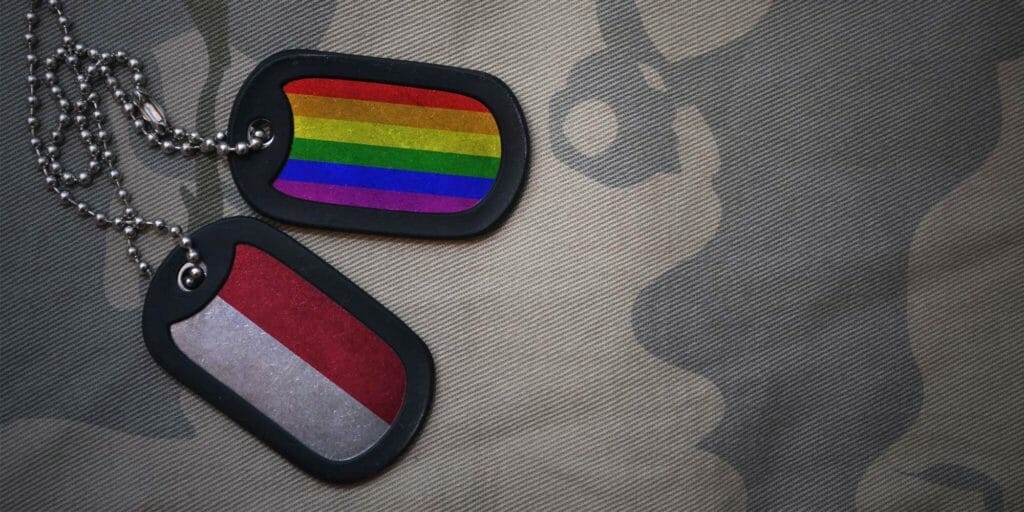The presidential elections of 17 April in Indonesia are a rematch of the 2014 encounter. The same two candidates, Mr Joko Widodo, popularly called Jokowi, and his adversary, retired general Prabowo Subianto are again vying for the highest political position in the country. Jokowi won in 2014, in part because of the enthusiastic support of thousands of volunteers, the so called cebong, tadpoles. They are thus named as Jokowi is known for his love for frogs. Although the polls are in his favour, (he is leading with between 11–20 percent), the race is far from over. For one, because the tadpoles are deserting him in droves and many are campaigning to vote golput, that is either abstaining or casting an invalid vote.
As the incumbent, Jokowi has obvious advantages. Not only can he control the security forces, in the transactional and clientelistic climate of Indonesian politics, the one in power can easily bestow certain favours and benefits. Jokowi can also rightfully boast of certain achievements, which Prabowo obviously cannot match. Though not as fast as Jokowi promised, the economy is growing at a steady pace (around 5 per cent). During his term, toll roads have been built, as well as airports and harbours, and in eternally congested Jakarta, the first stretch of an MRT line was opened, with a proud President on the first trip. The President, who is not known for his patience in dealing with the tedious portfolios of economic, social or political policies, and who has demonstrated little vision on the future of this sprawling archipelago, has made numerous visits to far way villages, generating much enthusiasm, and bestowing small amounts of money and other gifts to adoring citizens. He promised to develop the conflict-ridden area of Papua and indeed appeared on a sophisticated cross motor to ride its bumpy roads. During his term, progress was made in extending social services to the poor, including health care and educational and food subsidies. Although the President denied responsibility for the release of Siti Aisyah, the Indonesian domestic worker who was involved in the 2017 assassination of Kim Young Un’s half brother, Kim Jong-nam, in Malaysia, it is well known that the competent minister of Foreign Affairs, Mrs Retno Marsudi, had lobbied hard to achieve this release during the campaign period. Siti’s Vietnamese co-accused is still in prison.
Human Rights
Yet it is not all kudos. In 2014 Jokowi presented a nine-points plan for his term in office. The promise to deal with Indonesia’s numerous grave past human rights violations was the issue that led to most enthusiasm of his tadpoles. Finally a President who would look seriously at the post-October 1965 genocide and all the other unresolved cases, including the violence around the overthrow of the militaristic ‘New Order’ of Indonesia’s second President, General Suharto.
His political adversary, former general Prabowo, is a representative of that New Order. Not only is he an ex- son-in-law of the former dictator, he is also associated with grave human rights violations during the Indonesian occupation of East Timor and during the mass demonstrations in 1997 and 1998. Both cases have never been fully revealed, and Prabowo denies responsibility for having committed human rights violations. Perhaps because of his denial, his adversaries call his supporters kampret, bats, who just hang from the ceiling and are deaf and blind to the truth.
With his promise to resolve past human rights violations, including mass shootings in Papua, and Prabowo’s questionable human rights record, Jokowi seemed secured of the continued support of human and women’s rights activists. But he soon spoiled his progressive image. Not only did he uphold the death sentences of some drug convicts early in his term of office, he also surrounded himself with a powerful clique of notorious generals. Foremost among them is general Wiranto, Prabowo’s boss when the alleged human rights violations were taking place. Muchdi Purwopranjono, deputy head of the national intelligence service at the time, who is widely believed to be responsible for the high profile murder of human rights activists Munir, is a prominent member of Jokowi’s entourage as well. It is reported that Jokowi is supported by 35 generals with blood on their hands.1
During his term in office, Jokowi solved none of the cases he promised to tackle. He never acted on the recommendations of both the country’s own National Human Rights Commission or of the International People’s Tribunal for the 1965 Crimes Against Humanity. The President himself clearly still believes the lies propagated by the Suharto regime that the Indonesian Communist Party executed the murder of the country’s top generals (minus Suharto) on the fateful night of October 1, 1965. Suharto proclaimed this crime a coup attempt, falsely slandered Communist-affiliated girls of having castrated the generals and set about annihilating the PKI and progressive supporters of President Sukarno, in the largest bloodbath of Indonesian history (possibly one million people were murdered). Since then the army has kept up a constant campaign of hate mongering against people associated to the PKI. Human rights defenders or environmental activists are regularly accused of being ‘new communists’ and even imprisoned.
In Papua the President did not resolve the 2001 and 2003 Wamena and Wasior incidents, nor did he prosecute those responsible for the shooting in 2014 by the police of innocent civilians in Paniai or the many killings by the Indonesian security forces of Papuan people since then. When the well-known senior investigator of the National Corruption Commission, Novel Baswedan, suffered an acid attack in April 2017, which partly blinded him, Jokowi remained silent. Jokowi himself can be held responsible for the weakening of the Corruption Commission, when they were engaged in exposing high profile corruption cases involving prominent politicians.
When his former ally, the popular governor of Jakarta, the Christian Chinese Basuki Tjahaja Purnama (popularly known as Ahok) was convicted on trumped up charges of blasphemy, President Jokowi looked the other way. The two draconian laws which can be used to stifle political adversaries, the blasphemy law and the law on Electronic Information and Transactions (ITE) have not been weakened let alone repealed but instead have been used in the present presidential campaign primarily against the Prabowo camp. Raids on bookshops selling leftist books and the arrest of a university professor singing a song that was widely popular during the 1998 student demonstrations added to widespread feelings of betrayal in his former supporters.
Due to his own poor record on human rights, President Jokowi has not only lost the support of many of his former loyal supporters. He has also left himself open to various hoaxes. He has for instance been accused on social media of being associated with the banned Communist Party (PKI), to which he reacted with great irritation. If he had managed to revise the school curricula in line with the latest data on what happened in 1965 and beyond, he would have avoided this accusation, as the stigma of being associated with the PKI might have been lifted. On top of that he has not been able to capitalize on Prabowo’s dubious human rights record. In the presidential debates which were aired on TV both candidates avoided the issue of human rights.
Issues During the Campaign
What are the most contentious issues in the present presidential campaign?
On the economy both candidates offer similarly vague ideas. Environmental issues such as the large scale destruction of Indonesia’s forests and wildlife hardly feature. The rising gap in income, with enormous wealth concentrated at the top while the poorest sectors in society live in misery, does not seem to concern them. Both want to eradicate corruption, and neither of them is known to be personally corrupt. But with the present level of patronage politics the outlook for success is grim. Political campaigning is extremely expensive, and few people have the independent wealth to finance their own political campaigns. In the virtual absence of party support, candidates for all kinds of positions are dependent on external sources who somehow expect to be granted favours in return.
Generals flood both camps. They insist on continued impunity for the crimes against humanity committed by the security forces and resist any attempt to reveal the truth about the many human rights cases that burden the soul of Indonesia.
A worrying issue is the increased political self confidence of the military. During the New Order period many active officers held civilian positions. When the military dictatorship fell in 1998, this practice was curtailed. Now however, calls have been made to reinsert officers into civilian jobs. The reason stated is that so many officers are unemployed in the armed forces. Unemployment however is a wider problem than only that in the military; most people cannot see the rationale for the special treatment the military demand for themselves. Both presidential camps are flooded with generals, who have other demands as well. They insist on continued impunity for the crimes against humanity committed by the security forces and resist any attempt to reveal the truth about the many human rights cases that burden the soul of Indonesia. The dominant role of the military in Indonesian social and political life has been largely ignored in the campaign so far. In the present constellation, when Prabowo, himself is a retired officer, and Jokowi is surrounded by powerful military figures the dominant position of the army seems secured. Both candidates want the armed forces strengthened and pay little attention in their campaigns to the ongoing military operations in Papua. Nor do they denounce the military for their ridiculous rhetoric that the octogenarian survivors of the 1965 genocide and the LGBT community are waging ‘proxy wars’ against the nation.
Moral issues on the contrary dominate the political atmosphere. At one level the debate is presented as one between those who support the state ideology Pancasila (Five Pillars, ranging from Belief in One God so social justice) and those who would like to see Indonesia become an Islamic state. Both candidates however proclaim their support for the Pancasila. What is basically at stake is who can command most support of the Islamic masses. Here Prabowo is seen to have some advantages. Though he belongs to the nation’s elite, being associated with the oligarchy of the New Order regime, he is supported by a large electorate of the country’s poor and working classes and of the educated fundamentalist middle classes. Over the years he has built up a well-oiled grassroots political machine which is based on his own party, Gerindra, and the corruption-scandal-ridden Islamist party PKS. Though the PKS is in danger of not returning to Parliament, its members are known for their militancy. Prabowo also counts among his supporters the fiercely conservative firebrand cleric Rizieq Shihab. Though on self-exile in Saudi Arabia – fleeing from charges of pornography, based on an utterly conservative law he himself promoted – he is still able to incite his many followers, such as the notorious Islamist militia FPI (Islam Defender’s Front). It is these groups who successfully mobilized in large numbers to demand the imprisonment of Ahok and who now support Prabowo.
In August 2018 President Jokowi, in a bid to boost his own credentials among the Muslim masses, appointed a notoriously conservative cleric, Ma’ruf Amin, as his running mate. Since then the 75-year old former leader of the Indonesian Ulama Council, clad in his trademark sarung and sandals, accompanies the President. Amin is known to have issued fatwas (religious edicts) against religious and sexual minorities (and against high heels, Valentine’s day and yoga). He is also behind the fatwa that was used to incarcerate Ahok, Jokowi’s former friend. This appointment shocked the tadpoles, and alienated them even more. In another turn to the Islamic right, by the beginning of 2019 Jokowi proposed to release radical Muslim cleric and terror convict Abu Bakar Ba’asyir, who is amongst others associated with the 2002 Bali bombings. After a wave of national and international protests the decision to release him was withdrawn. The reason given was that the cleric refused to pledge loyalty to the state ideology, Pancasila, and the Republic of Indonesia.2 That he would do so however had been known for a long time.
With both camps fishing in the same electoral Muslim pond, the bargaining position of conservative Muslim groups has been strengthened. They want to criminalize homosexuality and extra-marital sexual relations in general and are opposed to the proposed law on the eradication of sexual violence. These groups have been very vocal in the past months. Neither candidate has explicitly referred to these issues, but it is clear that proponents of such strict Muslim guidelines are primarily to be found among Prabowo supporters. Prabowo, who hails from a rich family and whose running mate is a wealthy businessman, may be able to withstand pressures to succumb to the pressures of conservative groups better than Jokowi could in his first term. Proabowo is not known to be bigoted himself. But if elected he cannot afford to alienate his electorate and the clerics will demand a price for their loyalty.

Golput
The atmosphere in the camp of the cebong is markedly different from that in the start of the campaign. The binary division in human rights circles between those who supported Jokowi and those who declared to vote for Prabowo has lost its sharp edges. Disillusioned with Jokowi’s pandering to conservative forces, debates rage on WhatsApp and other social media platforms on whether one should still support the incumbent, even if he is now often referred to as ‘the lesser of the two evils’. But then it leads to the question, which indeed is the lesser one? Those who would never vote for a general and will no longer support Jokowi, opt to vote golput.3 This term first surfaced during the New Order dictatorship, when voting was obligatory. Golput, short for golongan putih, is a pun on the word Golkar, dictator Soeharto’s political party. Protesting voters would go to polling stations and put their mark on the white (putih) part of the ballot paper, thereby making it invalid. Now it also refers to people voting with their feet and simply abstaining.
The Nation Holds its Breath as Atmosphere Becomes Tense
The incumbent still has a comfortable lead in the polls.4 But the gap is narrowing and the President and his team are worried that swing voters may veer to the camp of the ex-general and that many people will abstain. Both remaining tadpoles and bats have been conducting aggressive door-to-door campaigns and have been using various forms of social media to spread their messages. Prabowo still stands a chance to win the Presidency. After all, who prophesied that Trump would win the American elections a few years ago and Mahathir in Malaysia in April last year? Just one week before the Indonesian elections the atmosphere in the country is becoming tense. Jokowi needs a large win to start out convincingly in his second term. Due to the inevitable problems on elections day in the huge archipelago, accusations of fraud are easily made. Some fear that if one candidate is declared the winner with a small margin, violence may erupt. Already warnings have been made by the Prabowo camp that ‘people power’ will be used if fraud is detected. While I am typing this report, news comes in of a clash between the two groups of supporters in Yogyakarta, allegedly started by supporters of Jokowi. So far the National Elections Committee has managed to conduct the campaign well and to maintain peace. The nation is holding its breath.
Saskia E. Wieringa
Filed April 7, 2019
* Opinions expressed in this article are the author’s own and do not necessarily reflect FORSEA’s editorial stance.
Banner Image | Banjarmasin, South Kalimantan, Indonesia, March 27, 2019: Joko Widodo campaigning. Photo: iman satria / Shutterstock.com
Read: COMMUNISTPHOBIA and TWO SEXUAL MORAL PANICS in INDONESIA from Saskia E. Wieringa.
- https://kabar24.bisnis.com/read/20140606/355/23933/ini-35-jenderal-penukung-jokowi–jk-5-jenderal-diduga-bermasalah
- https://www.thejakartapost.com/news/2019/01/23/baasyir-early-release-plan-cancelled-state-palace.html
- See for an example https://www.thejakartapost.com/news/2019/04/03/meet-lini-zurlia-the-poster-girl-for-protest-voting-in-presidential-election.html?
- See for an analysis of various polls https://www.thejakartapost.com/news/2019/04/05/lies-and-statistics-how-polls-differ-from-one-another.html



